- Home
- David Downing
Silesian Station (2008) Page 33
Silesian Station (2008) Read online
Page 33
Driving back from Grunewald after dropping off his son, Russell found himself wondering how many of those children had seen their fathers for the last time. Paul, at least, was lucky in that respect - neither of his would be sent to war.
He bought a paper when he reached Potsdamer Station, but no corpses had been discovered, no war declared. As for the trains, nothing was certain, but a journey to Bitburg was still theoretically possible. Trains were scheduled to depart for Cologne at nine and eleven on Sunday mornings, and both had connections to Trier and Bitburg. And yes, the clerk replied to Russell's query, both stopped at Potsdam. At twenty-two minutes past the hour.
Russell stopped off at Hunder's garage on the way home, and paid the usual inflated price for a full tank of petrol. Back at the flat, Effi was waiting in the red dress. 'It seems like a good night to go dancing,' she said.
They ate on the Ku'damm and headed east. The dancehall under Alexanderplatz Station was packed with people drinking too much, dancing too vigorously, laughing too loud. Berlin's adults were also saying farewell to peace, and the popping corks of their sekt bottles sounded like an ironic echo of the war unfolding in Poland.
Russell and Effi danced themselves to near exhaustion, then drove up to the Kreuzberg. The moon was yet to rise, the sky bursting with stars, and they sat on a wooden bench for a long time, looking out across the war-darkened city.
Russell arrived at Neuenburger Strasse soon after seven the following morning. He expected to find Sarah asleep, but she was emerging from the bath-room as he came up the stairs. Fifteen minutes later they were motoring south towards the Avus Speedway.
He had thought it better for her to join the train at Potsdam, and so avoid any possible checks at the main Berlin termini. He was probably overreacting - nothing had appeared in the papers to suggest a search was underway - but it was a nice day for a drive, all blue sky and late summer sunshine.
Their destination reminded him of Wilhelm's leaflet and article. He told Sarah about them, and his difficulty in getting them out of Germany. Would she be willing to take them across the border?
'Yes, but how...'
'I'll send them to you at the Hohenzollern Hotel. The post office will be shut today, and I wouldn't want you taking them on the train - there'll probably be spot-searches, particularly as you get near the border. But once you leave Bitburg...'
'It'll be just one more charge against me if I'm caught,' she said dryly.
'Something like that.'
'Of course I will,' she said.
'I'll send them off tomorrow. And if they get there after you've left, too bad.'
They reached Potsdam with almost an hour to spare. Sarah bought her ticket and they shared a mostly silent breakfast in the cavernous station buffet. The man in the ticket office had assured them the train was running, but it was still with some relief that Russell saw it round the long curve and ease in to the platform. It was less packed than some he had seen over the last few days, but still uncomfortably crowded.
Sarah Grostein didn't seem to mind. She climbed aboard with her small suitcase, turned briefly to mouth the words 'thank you', and disappeared into the throng. Russell watched the train pull out, frantic belches of steam giving way to a steady pumping. It wasn't over, he told himself - it wouldn't be over until she was out of the Gestapo's reach. But he had got her out of Berlin, which had to be safer for both of them. Slowly but surely, he thought, the artefacts and people that linked him and Effi to their various crimes and misdemeanours were disappearing. Perhaps they really were going to get away with it.
The two men were waiting for him at Neuenburger Strasse. He had a fleeting glimpse of Frau Heidegger's frightened face in the doorway as they bundled him into the back of the government Mercedes, a surprised look from the returning Beiersdorfer as they drove out of the courtyard. 'Where are we going?' Russell asked as calmly as he could, and wondered whether his abductors could hear the tremor in his voice.
'102 Wilhelmstrasse,' the man beside him said.
The SD? That had to be better news than the Gestapo, unless, of course, Hauptsturmfuhrer Hirth had come to know of his treachery. Russell wondered if the Soviets had betrayed him to the Germans, had added him to the list of gifts they were offering Hitler as part of their wretched Pact. He almost hoped they had, because Effi had played no part in his dealings with them.
Had she been arrested as well? He could see her back in that cell, so frightened and pale... Stop it, he told himself. Keep calm. Whatever they had, it was unlikely to be conclusive. Whatever the Soviets had said, he could always claim that he'd been stringing them along. You can do this, he told himself. A schoolmaster had once told him he could talk his way out of anything.
The car drew up outside SD headquarters, and the two men escorted him through the gardens and in through the main doors. They seemed almost friendly now, or maybe he was mistaking condescension for kindness. The blonde receptionist gave him a winning smile, but she would have blown Jesus a kiss on his way up Calvary.
The two men took him up to Hauptsturmfuhrer Hirth's door, knocked, and ushered him in. The Hauptsturmfuhrer's face showed irritation and dis-dain in equal measures, but that was probably how he got up in the morning. 'Please sit down,' he said, with unexpected courtesy.
Russell began daring to hope.
'There has been...' the Hauptsturmfuhrer began, only to be interrupted by a voice on the loudspeakers outside. He got up and closed the window. 'Do you know what that is?' he asked rhetorically. 'The English have declared war on the Reich. Their Prime Minister made the announcement an hour ago.'
'Ah,' Russell said. It seemed the safest thing to say.
'We've been expecting this for several days, of course. And that's why you're here. You, Herr Russell, have become a victim of your own success. Of the breadth of your connections, shall we say? Your links with the Soviets have proved most rewarding, and for that the Reich thanks you, but the Pact has reduced our need for intelligence from that direction. Your connections with your own country now seem more relevant, and the Abwehr has asked for your services.' He paused, and actually offered Russell a thin smile. 'You know what the Abwehr is?'
'Military Intelligence.'
'Precisely. Well, the SD may want you back at some time in the future, but for now the Abwehr's need is greater. They have your details, and will no doubt be contacting you in the near future.'
Hauptsturmfuhrer Hirth got to his feet, and Russell did likewise. 'Heil Hitler!' the Hauptsturmfuhrer said, and Russell managed a nod of recognition in response. He walked down the stairs and out past the chubby blonde secretary, repressing the urge to laugh out loud. As he crossed the rose-scented garden he made himself a promise - he would prove as faithful to the Abwehr as he had to Hauptsturmfuhrer Hirth.
Ruins
In the last week of September Russell took the early morning train from Silesian Station to Breslau. The fighting in Poland seemed almost over, the British and French were managing little more than rude gestures across the western frontier, and the Reichsbahn was running almost normally. As he travelled up the autumnal Oder valley, it seemed to Russell that for a nation at war, Germany seemed strangely at peace.
There had been no news of Sarah Grostein, which was probably good news. She might have been killed crossing the border, or she might have made good her escape - he would obviously have preferred the latter, but either would have rendered him safe. It was the third possibility - her capture and continuing interrogation - which sometimes sent a chill up his spine. He was learning to live with that and other uncertainties, but it wasn't easy.
Her lover's body was still feeding whatever fish there were in the oily Land-wehrkanal. Russell had found no official mention of his disappearance - a bureaucratic oversight perhaps, or just one of those loopholes that a war tended to open. If someone missed him now, they would probably search in vain.
Three of the young women rescued from 403 Eisenacher Strasse were on the mend, or at least gave tha
t impression. Ursel, Inge and Rachel ate, talked and slept like ordinary people, and even laughed on occasion. If they still seemed prone to flinching in close proximity to men, then no one was very surprised. During the previous week all three had visited the Aliyah offices on Meinekstrasse to enquire about emigration to Palestine.
Miriam, though, was still mute. A week or so after the rescue she had been seized by a violent fit, and others had followed. It looked like epilepsy, but the local Jewish doctors had ruled that out. What it actually was, they couldn't say. Russell had hoped to be taking her home by this time, but there was no way he could expose her to a journey like this, particularly when their reception in Wartha was so uncertain. Her parents had never replied to his letter.
His train reached Breslau in mid-afternoon, too late for a return trip to Wartha. He booked in once more at the Monopol, and then walked over to the Petersdorff store, intent on keeping his promise to Torsten Resch. The manager told him that the boy had been called up a couple of weeks earlier, and was probably in Poland.
Russell thought about contacting Josef Mohlmann, but decided it would be a mistake. He had often wondered whether Shchepkin - or someone like him - had honey-tongued the Reichsbahn man into working for the Soviet Union. Probably not, he guessed. There hadn't been time before the signing of the Pact, and Stalin's gloating opportunism wouldn't have appealed to a man like Mohlmann.
Russell hadn't heard from the Soviets himself, which, while not surprising, was still something of a relief. He had expected to hear from the Abwehr by this time, but they hadn't made contact either. Too busy mopping up in Poland, Russell guessed. He could cope with the wait.
He dined alone in one of the Ring's restaurants, and walked back to the hotel to ring Effi . Sounding both tired and wide awake, she treated him to a long and funny account of her day on set. He carried her voice up to bed with him, and quickly fell asleep.
The sky was overcast on the following morning, and a long hospital train rumbled through the station as he waited for the Glatz local. He imagined Thomas's son Joachim laid out on a pallet in one of the rattling boxcars, and wondered how Thomas and all the other parents - German and Polish - were getting through each day.
His own train finally departed, steaming south under a steadily-darkening sky. There was no transport for hire in Wartha's station yard, and again he set out on foot. The countryside seemed emptier than before, and as he turned up the dirt lane which led to the Rosenfeld farm a thin rain began to fall, blurring the line of the distant mountains.
There was smoke drifting up from the chimney of the neighbouring Resch farm, but no other sign of life. He walked on, rehearsing what he meant to say about Miriam, and was nearing the final bend in the lane when he realized that the field on his left was a sea of rotting crops. And that no column of smoke was rising above the screen of trees.
He quickened his pace, hoping against hope.
The stone walls and chimney were still standing, but that was all. The glass was gone from the windows, and a few blackened stumps were all that remained of the roof. The barn beyond had been burnt to the ground.
He walked to the open doorway and looked in. Scorched tiles lay half-buried in a slough of cinders and ashes. Everything was black.
It had happened a while ago, several weeks by the look of it.
There were no bodies in the house. He walked across to where the barn had stood and examined the blackened ground. He circled the ruins, and found no signs of digging in the overgrown kitchen garden or the copse of trees. He suddenly remembered the horse and cow - stolen, no doubt. But where were Leon and Esther Rosenfeld?
Perhaps they had been arrested. Dragged away to some unknown destination while the local thugs looted and burnt their home.
Or perhaps their blacksmith friend had warned them, and they had headed up into the mountains that Leon's grandfather had provided for such an eventuality. Russell stood in the lightly falling rain, gazing at the faint line of crests which marked the old border with Czechoslovakia. There were Nazis on both sides now.
Wherever they were, they wouldn't be back.
Ruins and more ruins, he thought. Of a farm and a family. Of the country he had known and once loved.
Table of Contents
Title Page
Copyright Page
Table of Contents
A Safer Life
Into the Cage
A Leap in the Light
Rehearsals
The Ostrava Freight
Leafleteers
Silesian Angels
The Wave of the Past
Jewish Ballast
Ruins

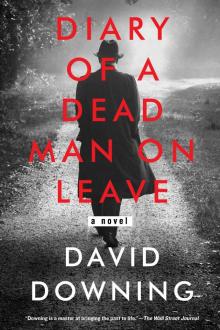 Diary of a Dead Man on Leave
Diary of a Dead Man on Leave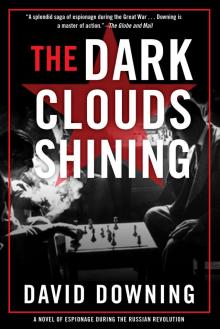 The Dark Clouds Shining
The Dark Clouds Shining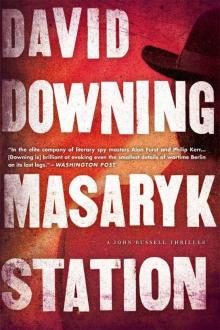 Masaryk Station (John Russell)
Masaryk Station (John Russell)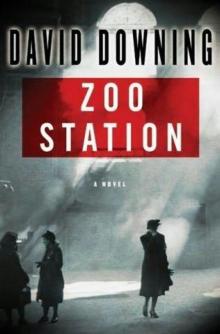 Zoo Stationee
Zoo Stationee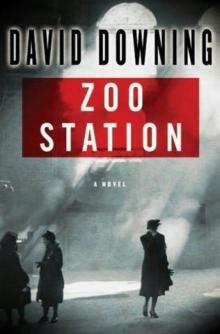 Zoo Station jr-1
Zoo Station jr-1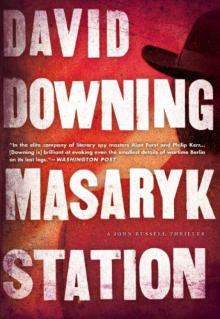 Masaryk Station
Masaryk Station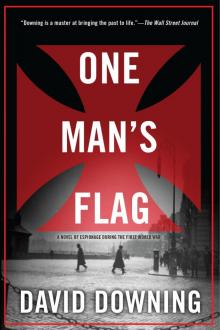 One Man's Flag
One Man's Flag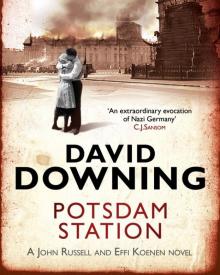 Potsdam Station jr-4
Potsdam Station jr-4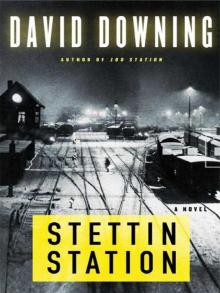 Stattin Station jr-3
Stattin Station jr-3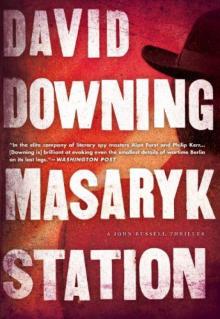 Masaryk Station jr-6
Masaryk Station jr-6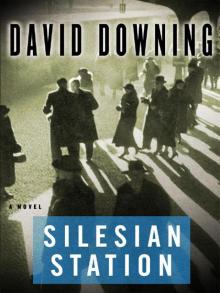 Silesian Station (2008) jr-2
Silesian Station (2008) jr-2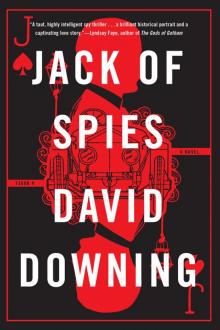 Jack of Spies
Jack of Spies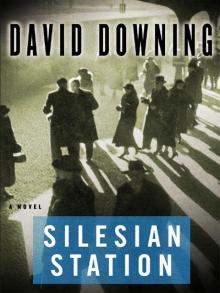 Silesian Station (2008)
Silesian Station (2008) The Moscow Option
The Moscow Option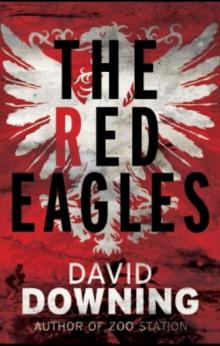 The Red Eagles
The Red Eagles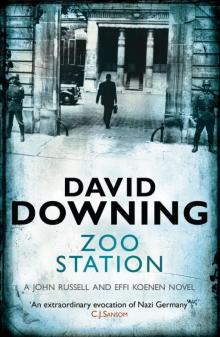 Zoo Station
Zoo Station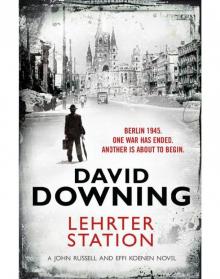 Lehrter Station
Lehrter Station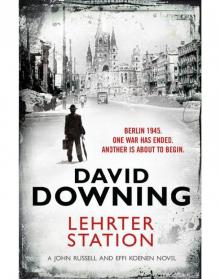 Lehrter Station jr-5
Lehrter Station jr-5